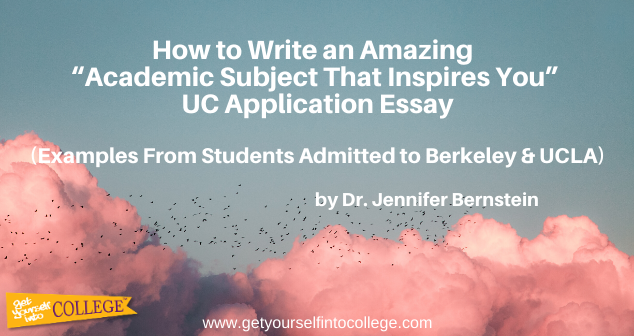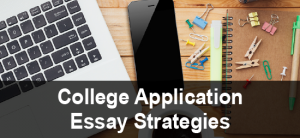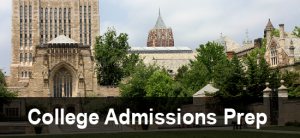All of my students who’ve applied to the University of California have written an essay in response to the prompt that asks you to:
“Think about an academic subject that inspires you. Describe how you have furthered this interest inside and/or outside of the classroom.”
Guess what?
I think you should also write the “academic subject that inspires you” essay and consider responding to the prompt that asks you to “Describe how you have taken advantage of a significant educational opportunity or worked to overcome an educational barrier you have faced.”
This advice is especially relevant to those of you applying to Berkeley and UCLA, the two most academically competitive UC schools.
Give yourself a few minutes to read the first part of the article, which helps you understand why it’s so important to write the “academic subject that inspires you” essay and how it can work together really well with the “academic opportunity” essay. Having a clear understanding of the underlying value and purpose of these UC application essays is just as important as the strategies that I share later in the article.
Why Is it so Important to Write One or Both of These UC Application Essays?
Let’s listen to what Berkeley and UCLA have to say about the matter.
They’re looking for evidence of things like your . . .
- “likely contributions to the intellectual. . .vitality of the campus”
- “exemplary, sustained achievement in any field of intellectual. . .endeavor”
- “personal qualities,” including “insight,. . .initiative, originality, [and] intellectual independence”
Yes, they emphasize that they review your application in a holistic manner, but let’s be real.
Just like any other highly competitive college, UC schools are looking for the academic heavy hitters.
They will glean some evidence from other parts of your application (e.g., your self-reported courses and grades in the Academic History section, list of activities and honors, and standardized test scores).
Many times your letters of recommendation will play a vital role in shedding light on your intellectual vitality, the way you contribute to intellectual communities, your significant academic accomplishments, and your personal qualities. However, UC schools DON’T accept letters of recommendation except in special circumstances. You don’t have the backup from your recommenders, and you definitely don’t just want to rely on your stats.
These two UC essays–the “academic subject that inspires you” and the “significant educational opportunity” essay–allow you to provide your UC readers with very valuable insight into what fascinates you intellectually and how you’ve taken action on those interests.
Should You Write Both the “Academic Subject That Inspires You” & the “Significant Educational Opportunity” Essays?
Maybe.
No matter what anyone says, there’s no one definitely right way that works for everyone, but let’s explore the situation.
Are you like my students who’ve devoted a great deal of time to exploring intellectual issues, questions, and projects that fascinate them?
- Have you developed a straightforward path in relation to your academic interests and kept building upon each prior step, advancing yourself higher and higher and going deeper and deeper?
- Have you gone on an intellectual journey that has lots of zigs and zags?
If you answered yes to either of these questions, it’s important to do the “academic subject that inspires you” essay because it allows you to tell your UC admissions readers about the evolution of your interest and “how you have furthered this interest inside and/or outside of the classroom.”
Your list of stats, activities, and awards don’t tell the story of. . .
- what lights you up about a specific academic subject
- what has been so transformational and exciting about the various ways you’ve “furthered this interest”
- how your experiences relate to each other
This essay gives you the opportunity to take your UC admissions readers inside your intellectual experiences and illuminate the path you’ve built up for yourself.
But. . .
You only have 350 words for each UC application essay, so in this “academic subject that inspires you” essay you don’t have a lot of space to go deep into each of the ways you’ve “furthered this interest inside and/or outside of the classroom.”
This is where the “educational opportunity” essay comes into play.
Let’s dig a little deeper.
- Have you worked on a meaningful project related to your intellectual interests?
For instance, have you worked on an independent project, completed a National History Day project, or worked in a lab or organization?
- Have you participated in a special program related to this “academic subject that inspires you”?
For instance, have you participated in TASP (Telluride Association Summer Program), SSP (Summer Science Program), RSI (Research Science Institute), Clark Scholars Program, or High School Honors Science, Math and Engineering Program?
Obviously, super competitive programs like these are meaningful to admissions officers, but any program that’s been meaningful to you is valuable!
If you answered yes to any of these questions, you should consider also writing the “significant educational opportunity.” This essay allows you to zoom in on a particular educational experience.
These two essays can be a very satisfying combination for readers because you’re giving them the overarching story of your intellectual interests and in-depth insight into one significant experience.
However, if you feel like your “academic subject that inspires you” essay covers enough of your meaningful project or participation in a special program, then you might not need to write the “educational opportunity” essay.
Develop a “Hook” Related to Your “Academic Subject”
You DON’T have to focus on something as broad as an “academic subject” like English, history, math, science, but you can. Sometimes focusing on a broad subject forces you to keep readers on the surface level of your interests and experiences.
You DON’T even have to focus on something as broad as a branch within such subjects (e.g., biology or chemistry), but you can. Even narrowing things down to a specific field within a subject can make you keep things on a superficial level.
You CAN focus on specific intellectual questions, issues, or problems within an academic subject that you find fascinating. This kind of “hook” can make it easier for you to take readers deeper into what it is that intrigues you and situate your range of experiences within this broader context.
Again, remember, there is no one right way!
UC Student Essay Example Related to the “Academic Subject” Hook
Let me tell you about one of my students who was accepted to Berkeley (as well as to Princeton and MIT). He focused on his fascination with astronomy, but he had a hook–a more specific focus–in his “academic subject” essays for UC and supplemental essays for other schools.
Before: In his initial draft, he just told a chronological story about the key ways he’d explored his fascination with astronomy.
The “this, this, this, and this” kind of narrative might enable you to hit on all the things you’ve done, but it isn’t interesting for readers.
During: I’d been mentoring this student for a few years, so I knew that there was one specific underlying thing that he finds so compelling about astronomy. He loves the way studying astronomy stretches the limits of his imagination and understanding, so I encouraged him to develop a few anecdotes related to his experiences. These anecdotes showed his UC readers what it’s like for him when he’s out exploring the boundaries of knowledge and shared some really intriguing ways astronomy boggles the mind.
After: The new “hook” and his anecdotes enabled readers to feel this wonder for themselves and even learn something cool about astronomy. Keep in mind that his “hook” and anecdotes were directly connected to specific ways he “furthered this interest.” This part of his UC essay on “an academic subject that inspires” him then led into a second “hook”: his description of how he has been working to set the foundation for fulfilling his big goal of contributing to the process of pioneering safe, efficient systems of travel that will enable us to discover the resources available throughout the unfathomable magnitude of outer space.
Analysis: Admissions officers are reading hundreds and hundreds of essays. Don’t you want them to read your essay and feel inspired? Don’t you think someone in their situation enjoy having their own minds activated and learning something new? This student’s revised UC essay achieved these goals.
Keep reading to learn more about how you can make your own interests come to life within your writing and engage the attention of your UC readers.
Avoid Merely Listing the Ways You’ve “Furthered This Interest”
Okay, so I touched on this point before, but it’s worth repeating because I come across this problem quite frequently when giving feedback on this UC application essay.
Some of my most talented students have done so many exciting things related to their academic interests that they wind up trying to stuff their essay with the long list of things they’ve done.
I get it.
You want to showcase all of your amazing work, and you only have 350 words for this essay.
But you DON’T want to turn your “academic subject that inspires you” essay into an essay version of your resume.
Just listing your actions and accomplishments is boring for readers. . .even if you’re mentioning really impressive sounding experiences. Also, remember that your UC readers can easily get this kind of listing of experiences from other parts of your application.
Tell the Story of Why You Find This Academic Subject so Inspiring
Yes, yes. The essay prompt is asking you to “describe how you have furthered this interest.”
What’s going to make your essay so interesting to your UC admissions readers is your story about WHY this subject is so inspiring to you, why it matters to you, why it’s important.
This “why” is something that’s not evident from your self-reported transcript or your list of activities and awards.
Way back in 2009, Simon Sinek gave a TEDx talk called “How Great Leaders Inspire Action,” which has now been viewed over 48 million times. Sinek talks about how “people don’t buy what you do; they buy why you do it.” He explains:
“By `why,’ I mean: `What’s your purpose? What’s your cause? What’s your belief? Why does your organization exist? Why do you get out of bed in the morning? And why should anyone care?’”
As he points out, “inspired leaders and inspired organizations. . .all think, act and communicate from the inside out.” Sinek notes that Martin Luther King Jr. didn’t give the “`I have a plan’ speech.’” He delivered the “`I have a dream’ speech.”
You are not selling a product or pitching your organization.
But at the same time, you’re not writing about yourself for yourself. You’re writing about yourself for admissions officers who are reading hundreds of applications.
You’re pitching yourself to admissions officers, and you want them to care about you and to get behind your big visions and dreams and interests, even if these are things that they know nothing about.
You want to situate how you’ve taken action on your academic interest within the context of your why.
My astronomy student awakened his UC readers to his sense of wonder, how thrilling it is to press past the limits of knowledge into new frontiers, and his quest to contribute to space exploration. He situated his discussion of specific experiences in Science Olympiad, the International Olympiad on Astronomy and Astrophysics, and the Summer Science Program within this “why” context.
Another one of my students, who was positioning himself for engineering programs, wrote about his quest to contribute to the process of decreasing fossil fuel consumption to make electricity more accessible and affordable. He wrote about why this particular issue matters to him and told the backstory about his country’s problems with electricity. Then he situated all the things he’s done to start building up a path that prepares him for this work within this “why” context.
Admissions officers are looking for ways to root for you.
When admissions officers understand your quest and your “why.” It’s a whole lot easier to lobby for you.
WAYS TO WORK WITH DR. BERNSTEIN!
Click here to learn how to schedule a private consultation with Dr. Bernstein.
Click here to learn more about Dr. Bernstein’s ongoing private college preparation and college admissions support.
Click here to learn about the online Get Yourself Into College® program.
Blog post image: ©kenrickmills/unsplash.com



